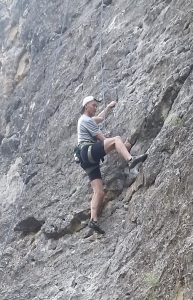Effects of a Supplemental Strength Training Intervention on Climbing Performance in Recreational Climbers
Chad Palmer, graduate student in Kinesiology (719-298-6337, chadpalmer@adams.edu)
Rock climbing is a young sport on the competitive scene. Due to the youth of the sport, there is insufficient research on the strength training needs for climbers, and researchers are calling for more research to be performed on the topic. The present study aims to implement a strength training program that focuses on the specific energy needs and muscles used during rock climbing performance.
The purpose of this study is to examine the effects of a sport specific supplemental strength training program on rock climbing performance in recreational climbers. A secondary purpose of this study is to examine the relationship between climbing performance factors and actual climbing performance. The factors that will be examined are grip strength and body composition, specifically lean mass, and strength to mass ratio.
This study will be examining recreational rock climbers defined as climbers with a minimal climbing age of six months and who climb a minimum of one to two times a week.
Pre-testing and post-testing will be conducted through three appointments. The first appointment will be used for the climbing assessment, the second will be used for the 1RM pull-up test and measuring grip strength using hand grip dynamometry, and a third appointment will be used to measure body composition using a hydrostatic weighing tank.
Participants in the present study will be encouraged to maintain their current level of climbing in addition to performing an eight week strength training intervention. The strength training intervention will require two sessions per week of supervised strength training exercises. The experimental group will be given sport specific strength training exercises while the control group will receive general strength training exercises. The experimental and control groups will be randomly selected.
In addition to receiving supervised strength training session, participants in this study will experience other benefits. Through participation in this study, participants will have their body composition measured which will allow them to know their body fat percentage and strength to mass ratio in relation to the strength tests that participants will undergo as well. Participants may experience an increase in their climbing performance as a result of participation in this study. Participation in this study will assist the researcher in examining the strength training needs of rock climbers, and help with the development of standardized strength training protocols.

